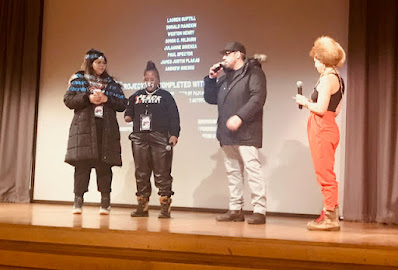I missed the noon movie Sunday. I just needed a little more time to recuperate.
Saturday morning had a great set of Alaska themed or made films. I was very pleased that we are past the days when Alaska films were any Alaskan project where someone writes a story and goes out (usually) into the woods and experiments with how their cameras and mics work.
That elation didn't survive Sunday's Alaska Shorts Program. There were good ones mostly. And that's all I'll say.
The afternoon Documentary Feature - The Body Politic - was a riveting look at Baltimore mayor Brandon Scott. We see Scott elected into office as a young Black man who saw his first shooting at 10, and vowed that the basic approach of mass arresting of Black men had to be replaced. The alternative was to give people options in life other than crime and prison. He comes into office after 327 (maybe it was 37) people had been murdered in the previous year, vowing to cut murders by 15%. But pro-active reaching out to folks is a long term strategy and takes a while to work. He monitored every murder as they outpaced his target. The Republican governor, who controlled prisons, parole, and critical social services, refused to meet with Scott and said he needed to beef up the police to stop the crime.
The discussion afterward included director Gabriel Francis Paz Goodenough, film subject Erricka Bridgeford, and another film maker whose name and role I didn't quite catch. Ida, the director of the festival is on the right. Ericka is in the middle.
You can read more about the film from a Baltimore paper and read an interview with the director here.
The next shorts program began with another excellent film - The Bond - which was short and packed a powerful punch as we see an incarcerated woman having her baby, shackled, and then having the baby taken from her. The filming, the story, the acting were all just right.
The last program were three films related to prison and domestic violence.
Infraction told the true story of an inmate who the judge had, at some point concluded was innocent, but was still locked up.
Seeds of Change told the story of a farmer who takes on the project of setting up a farm adjacent to a prison and then utilizing prisoners to work on the farm. The fresh food is served in the prison. The film shows the effect of the farm work on the prisoners who worked there and the effects of having fresh food prepared well on the prisoners.
Where I Learned Not to Sleep - The camera follows two retired police who grew up with domestic violence, doing training programs for police on how to approach domestic violence situations.
The whole afternoon and evening illustrated the need to treat citizens, abused women, and prisoners with dignity and respect to break the cycle of violence and criminality.
There's much more to say, but this at least gives you a sense of what I got out of the festival on Sunday.

No comments:
Post a Comment
Comments will be reviewed, not for content (except ads), but for style. Comments with personal insults, rambling tirades, and significant repetition will be deleted. Ads disguised as comments, unless closely related to the post and of value to readers (my call) will be deleted. Click here to learn to put links in your comment.